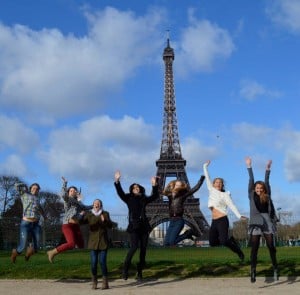For many millennials, the smartphone is an extension of the body.

We constantly check our screens for texts, e-mails and notifications. This dependence has become so strong that it’s not uncommon to see a group of friends at a restaurant sitting in silence—their eyes glued to their cellphones.
It has become socially accepted to tend to the latest text instead of committing oneself to the personal interaction at hand.
Born and raised in the Computer Age, I didn’t know a life without technology. This past winter quarter, however, I had the opportunity to study abroad in Madrid. That meant (per my parents) turning off my data plan and abandoning my iPhone in order to avoid huge phone expenses.
My first reaction? Anxiety. Noooooooo! How could I ditch my iPhone for 10 whole weeks?
After a few days in Madrid, I found that I could handle situations without the smartphone (alebit with the slight help of an on-the-go phone call/text only flip phone).
Here’s what I learned:
I became more dependable and less fickle.
Be there in 10. Sorry, running late. Where are you? I don’t know if I’m going, maybe. How often do we have these smartphone conversations? I know I’m guilty. At home, always being connected made me fickle. I didn’t have to commit to an event or I would change my mind at the last minute. Studying abroad changed me.
Being in an unfamiliar place without absolute connectivity and a dependable phone was scary. Many times, I’d forget to refill the on-the-go plan to get more minutes or the flip phone would run out of battery. So I learned to be decisive. When my friends and I committed to a time and place, we stuck to it.
I enjoyed an increase in face-to-face time.
All eyes on me. It’s good to see your face.
I found that since I was not dealing with text messages, e-mails or notifications at the palm of my hand, I was forced to actually pay attention to the person I was with—no distractions from the smartphone. I learned to relish quality conversations around the dinner table.
I became more proactive and aware of my surroundings.
I’m the first to admit that I’m directionally challenged. At home, I relied on Google Maps. In Madrid, I would sometimes screenshot the directions, but most times I had to use a printed map. I learned to scan my surroundings, look for landmarks and pay attention to where I was going. I also learned to swallow my pride and ask strangers to help me with directions. Most were more than willing to guide me the right way.
Unplugging from the world can be peaceful. Not having the anxiety of checking my phone every 10 minutes gave me a sense of peace. As corny as it sounds, I enjoyed quiet walks around the city appreciating beautiful old buildings, people watching and, yes, catching sunsets.
I have learned that without a smartphone—although it made some situations a bit more complicated—I could survive.
I’ll be spending a lot less time with Siri.
This post was originally published on thedishdaily.com before it was acquired by The Stanford Daily in summer 2014.
